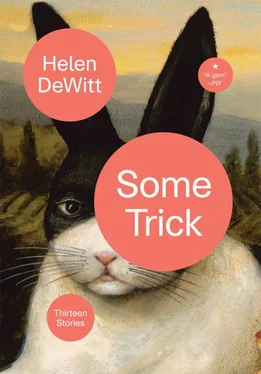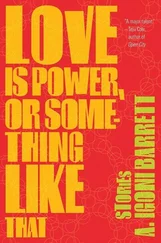It would have been possible for Eloise to say something about Agamben at this point, but she felt awkward, now, meeting K.
K was an Abstract Situationist. His sentences had their cold beauty.
He stated in interviews that art should concern itself with the operation of the machine.
The operation of the social machinery, he would add for clarity, though he disliked the phrase.
K was very grand, so grand that he could refer to himself as K in his work without a murmur of editorial dissent. Eloise was very young and not at all grand. She had known K’s work for years and had imagined that it was open to anyone to follow his example, or rather that it was open not only to K but to anyone to follow the example of the usual suspects. If K had this licence only in virtue of his position he would, as an avowed Situationist, have embedded a statement to this effect in the work — so she had thought, being a mere Naïve Situationist at the time.
She had been wrong about this as about so many other things.
Eloise had written a book and been made to have discussions in which the phrase ‘flesh out’ was used of characters. She was just out of college. She had been reading Robbe-Grillet. She had recently seen Dogville . In a moment of weakness she had attached to four characters the sort of name that is affixed to a little primate at birth. Each was also provided with hair, eye, and skin colour, a wardrobe, some sort of plausible history. A favourite TV show. What with all these plausible names and histories, the characters went plausibly about their business like impostors in a witness protection programme. It was, of course, awkward to be known to K as the person whose name appeared on the cover of the thing.
(She was, as it happened, safe enough: the word ‘contemporary’ was enough to put K off a work of fiction.)
K, meanwhile, talked on.
K drew attention to the difference between a cliché and a formula. (He preferred the fixed formulae of the Homeric poems to the polished phrases of Vergil.) K had once read an essay by Harold Bloom in which the great man found fault with J. K. Rowling for using the phrase ‘he stretched his legs’ whenever a character went for a walk. K had immediately lost all respect for Harold Bloom, who appeared not only to be unfamiliar with Milman Parry’s The Making of Homeric Verse but also to be wholly innocent of the Iliad , Odyssey , Homeric Hymns , Epic Cycle and Argonautica except, perhaps, in some sort of translation. Taken to its logical conclusion, the argument would compel one to prefer the Argonautica to the Iliad . Madness! (K had tried to do a search in the Perseus project for ton d’apameibomenos prosephe (that old Homeric wordhorse), was balked by an uncooperative search engine, left Bloom with a shrug unenlightened.) The problem with J.K.R. was not that she was repetitive, nor even that she was not repetitive enough, but rather that she was insufficiently formulaic. Judging by the 3 pages K had been able to bring himself to read before remembering that we are creatures of a day.
All this time Eloise was working up her courage. K loved to say of the Greeks that they experienced their subjectivity as a trajectory through a nexus of social interstices, linguistic artifacts cast in or broken by the machinery of legal systems. To hear K discourse on the character of Odysseus in Sophocles’ Ajax was to have a memory to save up for one’s grandchildren. Surely K, then, would not be blind to the predicament of one required to engage with the modern machinery of the law?
Eloise’s situation was that she had written a new book, one which required the legal muscle enjoyed by K if its characters were not to find themselves in a witness protection programme. K was so grand that his contracts were negotiated by someone very grand indeed. Eloise’s lawyer, who was not at all grand, claimed that the boilerplate was non-negotiable. Eloise had the true hacker’s love of economy of effort; K had a perfectly good contract negotiated by a master of the art, on which her unloved lawyer was unlikely to improve; why could this unimprovable document not be redeployed? When they were all very drunk (they had fasted, after all, for a night and a day) Eloise put this ingenious suggestion to K, who said he was not comfortable mixing business with friendship.
The formulaic reply made it clear that K was not new to ingenious suggestions.
K had more serious matters to contend with. He was in the midst of protracted negotiations of a delicate nature. The mother of his bride would not brook kosher catering for the wedding. His sister, who had joined the Lubavitch after a turbulent youth, would not permit her seven children to eat cake if it were not kosher. It would be cruel and inhumane to invite children to a party at which they could not eat cake; K’s soft heart melted. The points at issue were whether, on the one hand, a kosher cake from an approved purveyor might pass muster with his sister, provided the cake were kept strictly segregated from all other comestibles, and whether, on the other hand, such cake might be acceptable to a non-religious fanatic.
One charming Night
Brings more delight
Than a hundred, than a hundred, than a hundred lucky Days —
Eloise’s editor left for another job. The new editor was unenthusiastic with the legacy. No contract had been signed. The characters were given an unexpected reprieve from the witness protection programme.
Eloise was introduced to an agent who sold her book in a week. The book had been in a mixture of first, second and third persons; the editor thought it would work much better if it were all in first.
K and his bride found an apartment on Central Park West, easy walking distance to Lincoln Center and a shul with an intelligent rabbi.
K published to acclaim a book which alternated between first, second and third persons.
K was not at all sporting about the thing with the Cathedral. He shared it genially with his friends at shul, mischievously at dinner parties. Americans naturally like to hear that the British are stuck in the mud; the story was passed round to the point where Nigel, an ambitious young Canon at Bath and Wells, heard it three times in a single day on a trip to New York.
Eloise’s new editor left for another job. The replacement examined the legacy and saw at once that the book would work better in third person.
K won a prize for the new book, thus becoming much grander.
Nigel had been keeping his ear to the ground. He saw at once that the thing, used properly, might just do for his Bishop, who was quietly pining for a shot at Canterbury. It would be the most terrific coup if Bath and Wells could persuade the now indisputably distinguished K to accept carte blanche .
By the most extraordinary piece of luck, Boulez agreed to come to London to revive his production of Moses und Aron.
Nigel whispered in the ear of a very dear friend at Covent Garden: it would be quite wonderful if Boulez and K were to appear in conversation before the great event. Boulez was, in fact, an admirer of K; K agreed to the treat (with the promise of accommodation at Claridge’s and a box for opening night).
Nigel was then able quite naturally to reply to K’s benevolent thanks for his efforts.
The Bishop and Mrs Bishop trusted him implicitly; if an invitation to the Glyndebourne Arabella would lure the Nobel laureate in posse, to Glyndebourne they would go. Mrs Bishop handsomely undertook to lay on hampers from Fortnum’s, strictly kosher in case of need — one could always count on Mrs B.
K was all amiability in agreeing to join the episcopal party. He was not, in fact, at all particular in matters of kashrut, but he very much liked to be asked.
Читать дальше












